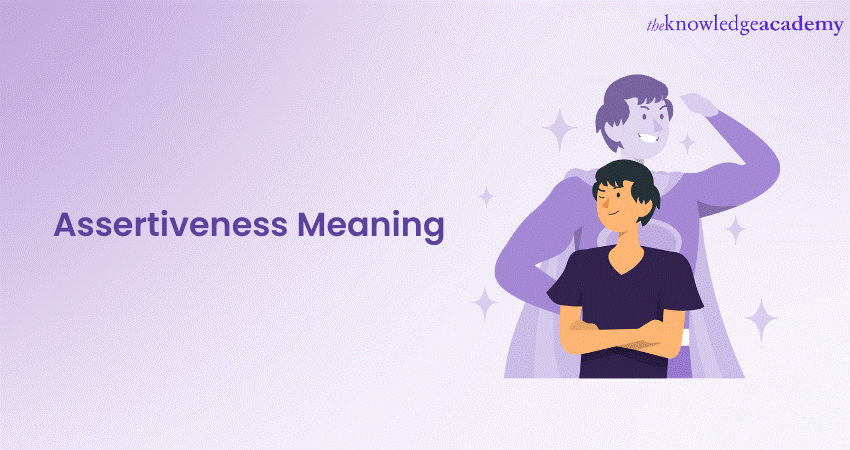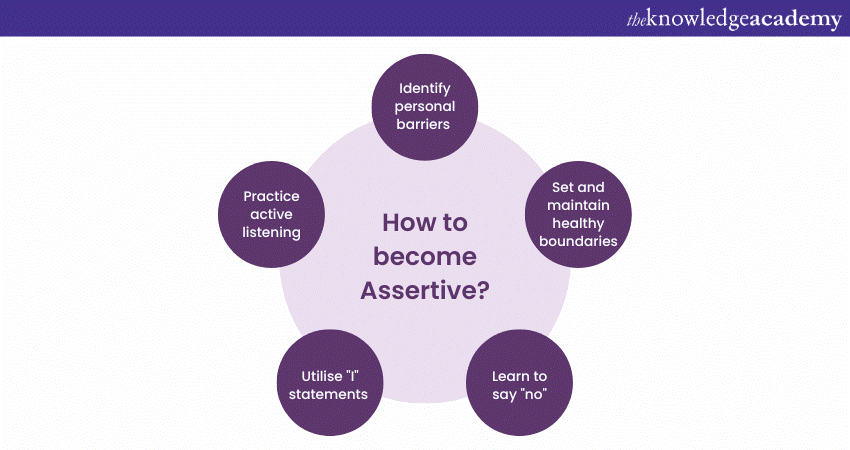We may not have the course you’re looking for. If you enquire or give us a call on +27 800 780004 and speak to our training experts, we may still be able to help with your training requirements.
Training Outcomes Within Your Budget!
We ensure quality, budget-alignment, and timely delivery by our expert instructors.

In today's fast-paced world, effective communication is the key to success in both personal and professional endeavours. But do you know what is the key to effective communication? It is Assertiveness. Assertiveness Meaning empowering individuals to express their thoughts, feelings, and needs while respecting the rights of others.
It is the ability to communicate assertively, expressing oneself clearly and respectfully without being aggressive or passive. Explore our blog on the Assertiveness Meaning and learn how this vital skill empowers individuals to express their ideas, convictions, and feelings with confidence. Read more!
Table of Contents
1) What is the Meaning of Assertiveness?
2) Passive, Aggressive and Assertive: What’s the difference?
3) The importance of Assertiveness
4) How to become Assertive?
5) Conclusion
What is the Meaning of Assertiveness?
Assertiveness can be defined as the ability to express oneself clearly and respectfully without being aggressive or passive. It is a Interpersonal Communication style that strikes a balance between standing up for one's rights and beliefs while also considering the perspectives and feelings of others. Being Assertive promotes effective and empathetic dialogue.
Assertive individuals are confident in expressing their thoughts and feelings while maintaining respect for others' boundaries. They are Assertive, not aggressive, when addressing conflicts or expressing disagreement, seeking resolutions that benefit all parties involved. This communication approach promotes mutual understanding and respect in personal and professional interactions.
Assertiveness allows individuals to set and maintain healthy boundaries without feeling guilty or compromising their values. Active listening is another essential aspect of Assertive communication, allowing Assertive individuals to show empathy and understanding, promoting an honest exchange of ideas. This active listening promotes deeper connections and builds trust in relationships.
Passive, Aggressive and Assertive: What’s the difference?
When it comes to behaviour, the idea of Assertiveness behaviour is often presented as a middle ground between being Passive and being Aggressive. A more accurate way to conceptualise the three would be to view them as points on a triangle. Each point represents a distinct mode of behaviour, with Assertiveness occupying a unique position that balances and blends elements of both Passivity and Aggression.
Assertiveness
Being Assertive involves being considerate of your own and others' rights, wishes, wants, needs, and desires. It entails fostering an open and honest exchange of views, wishes, and feelings between individuals so that both parties can act in a manner that is beneficial to all.
Assertive individuals are adept at listening to the opinions of others and responding appropriately, regardless of whether they agree with those opinions or not. They are also capable of delegating tasks to others while taking full responsibility for their actions.
Passivity
Passive or non-assertive responses often lead to compliance with the wishes of others, which can undermine individual rights and self-confidence. Many individuals adopt a Passive approach because they have a strong desire to be liked by others.
Such individuals do not see themselves as equals because they prioritise the rights, wishes, and feelings of others over their own. Being Passive leads to a lack of communication of thoughts or feelings, resulting in individuals doing things they do not want to do in the hopes of pleasing others. This also means allowing others to take responsibility, lead, and make decisions for them.
Being Aggression
Aggressive behaviour can undermine the rights and self-esteem of others. Aggressive individuals fail to acknowledge the views and feelings of other individuals and rarely shows appreciation or praise for their efforts. Instead, it tends to put others down, leading them to respond in a non-assertive way.
Aggressive responses can encourage others to act either passively or aggressively. There are many forms of aggressive behaviour, such as rushing others unnecessarily, telling rather than asking, ignoring someone, or disregarding their feelings.
Learn how to communicate confidently and express your ideas – join our Communication Skills Training.
The importance of Assertiveness
Embracing Assertiveness offers a plethora of benefits that positively impact various aspects of life. One of the most significant Advantages of assertiveness is its impact on building healthy and meaningful relationships. When individuals practice Assertive communication, they are open and honest in expressing their thoughts and feelings. This fosters an atmosphere of trust and mutual support where both parties feel respected and valued.
Assertiveness also boosts self-confidence and self-esteem. When individuals Assertively express their needs and preferences, they take ownership of their desires and beliefs. This sense of empowerment leads to a greater understanding of one's worth and abilities, enabling personal growth and development.
Being Assertive is also a crucial tool in conflict resolution and problem-solving. Rather than avoiding or escalating conflicts, Assertive individuals address them directly and respectfully. They seek win-win outcomes, considering the needs and perspectives of all parties involved. This approach promotes cooperation and understanding, resulting in effective resolutions.
In professional settings, being Assertive is especially valuable. It allows individuals to communicate their ideas and opinions confidently, enhancing their influence and impact within the workplace. It also encourages teamwork and collaboration, as Assertive team members are more likely to contribute openly and constructively to discussions and decision-making processes.
Gain confidence in communicating with others with our Assertiveness Skills Course!
How to become Assertive?

While being Assertive is a valuable skill, it may not come naturally to everyone. Identifying personal barriers, such as fear of rejection or low self-esteem, is the first step toward developing Assertiveness. Setting and maintaining healthy boundaries and learning to say "no" when necessary are essential components of this skill. Apart from gaining these Assertiveness skills, individuals can become Assertive by following these steps:
Identify personal barriers
The journey to Assertiveness begins with introspection and recognition of personal barriers that hinder open communication. These barriers could stem from past experiences, cultural upbringing, or low self-esteem. By identifying these obstacles, individuals can gain insight into their communication patterns and work towards overcoming them.
Set and maintain healthy boundaries
Assertive individuals have clear boundaries and are not afraid to communicate them. Establishing boundaries involves understanding one's limits and being comfortable expressing what is acceptable and what is not in various situations.
Learn to say "no"
Saying "no" is an essential part of being Assertive. It is crucial to recognise that saying "no" is not inherently negative or selfish; rather, it is an act of self-preservation and self-respect. Learning to decline requests or invitations respectfully empowers individuals to prioritise their well-being without feeling guilty.
Utilise "I" statements
Effective communication involves expressing thoughts and emotions clearly and without blaming others. Using "I" statements allows individuals to take ownership of their feelings and experiences without accusing or attacking others. For example, saying "I feel overwhelmed when..." instead of "You always..." fosters more constructive conversations and reduces defensiveness.
Practice active listening
Assertiveness also involves being an attentive and empathetic listener. Active listening means fully engaging with the speaker, seeking to understand their perspective without interrupting or jumping to conclusions. It shows respect for the speaker's opinions and helps build stronger connections in personal and professional relationships.
Want to boost your confidence? Check out these Books on Assertiveness!
Conclusion
We hope that after reading this blog, you have understood the Assertiveness Meaning and how this skill can empower you to express yourself. Being Assertive is a powerful skill that empowers individuals to communicate confidently and respectfully. By mastering this skill, one can build healthier relationships, enhance self-esteem, and navigate conflicts effectively. Embracing Assertiveness is a journey that involves identifying barriers, setting boundaries, and practising active communication. As individuals continue to develop this valuable skill, they will experience numerous benefits in their personal and professional lives.
Speak confidently to the masses with our Public Speaking Training.
Frequently Asked Questions
Upcoming Business Skills Resources Batches & Dates
Date
 Public Speaking Course
Public Speaking Course
Fri 28th Feb 2025
Fri 11th Apr 2025
Fri 27th Jun 2025
Fri 22nd Aug 2025
Fri 24th Oct 2025
Fri 28th Nov 2025







 Top Rated Course
Top Rated Course



 If you wish to make any changes to your course, please
If you wish to make any changes to your course, please


